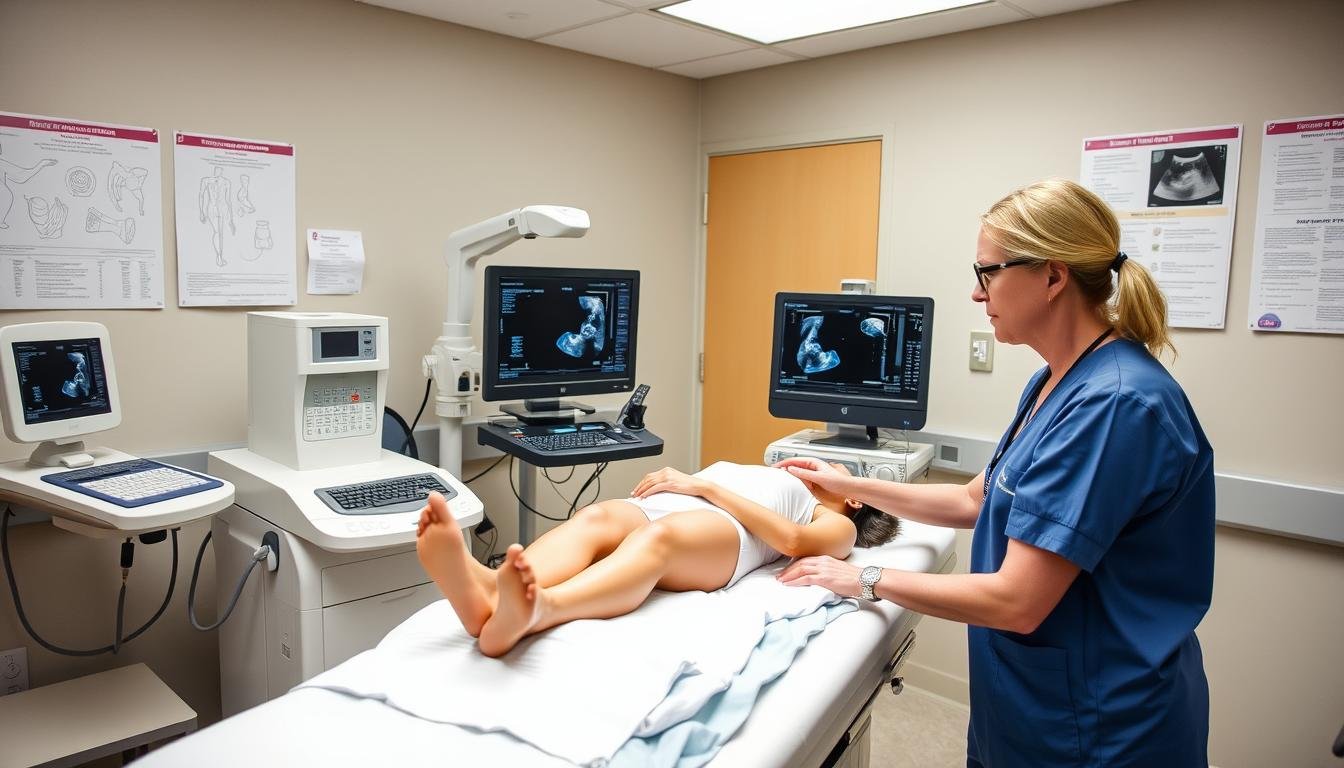Becoming an ultrasound tech is an exciting career path. It blends healthcare, technology, and patient care. The journey varies for each person.
Many factors affect how long it takes to become certified. These include the program you choose and your prior education.
Your career goals also play a role. Understanding the timeline helps you plan for your future.
We’ll explore the typical steps to become a certified ultrasound tech. We’ll also look at what can change the length of your education.
A vibrant classroom setting focused on ultrasound technology education, featuring a modern ultrasound machine, students engaged in hands-on training, anatomical models displayed, a large window with natural light illuminating the space, medical charts on the walls, and an instructor demonstrating techniques.
Introduction to Ultrasound Technology Careers
Ultrasound technicians play a key role in healthcare. They use special equipment to create images of internal body structures.
These images help doctors diagnose and plan treatments. Sonographers perform various scans, including abdominal, cardiac, and obstetric procedures.
They work with doctors to interpret images. They also look for changes in a patient’s condition.
Ultrasound techs maintain equipment and ensure patient comfort. They also document exam findings for medical records.
The need for skilled ultrasound technicians is growing. This career offers a chance to help patients and use advanced technology.
Ultrasound techs are becoming more important in healthcare. They help diagnose and manage many medical conditions.
Educational Pathways for Aspiring Ultrasound Techs
Ultrasound techs, or sonographers, have two main education options. These are associate’s and bachelor’s degree programs in ultrasound tech or sonography.
Associate’s degree programs usually take two years to finish. They teach basic ultrasound skills and are often cheaper.
Bachelor’s degree programs last four years. They cover more advanced topics and may lead to better jobs.
All ultrasound techs need to get certified. This means passing a national exam.
Two big groups offer these exams. They are ARDMS and ARRT.
Timeframe for Completing an Ultrasound Program
Ultrasound tech programs vary in length. An associate degree typically takes about 2 years to finish.
A bachelor’s degree in sonography usually requires 4 years. It offers more in-depth education and career options.
Program length depends on several factors. These include specific requirements and whether you attend full-time or part-time.
Your previous education or experience may also affect the duration. Some programs offer accelerated options for faster completion.
Research different programs to find the best fit. Compare options to match your educational and career goals.
Understanding typical timeframes helps with planning. It allows you to make informed decisions about your education.
Factors Affecting the Duration of Education
Ultrasound tech training length varies. Full-time programs take 18-24 months. Part-time programs may take 2-3 years.
Personal commitments can affect certification time. Employed students might choose part-time ultrasound tech programs. This balancing work and education can extend the process.
Program requirements influence timelines. Some offer accelerated options. These can shorten the time to graduation.
Clinical Training Requirements
Ultrasound technicians need hands-on experience to excel. Clinical training is vital in sonography programs. It helps students apply knowledge and develop skills.
Clinical rotations usually last several months. Students work in real healthcare settings. They learn from experienced ultrasound technicians.
Students practice using ultrasound equipment during training. They also learn to interpret images and talk to patients.
“An ultrasound tech in a clinical training environment, focusing on a patient lying on an exam table, surrounded by advanced ultrasound equipment, a mentor demonstrating techniques, medical charts on the walls, soft clinical lighting, a sense of professionalism and dedication in the atmosphere.”
This training prepares students for their future careers. It combines classroom learning with practical experience.
Graduates gain the skills needed for high-quality patient care. They become confident in their abilities as ultrasound technicians.
Preparing for Certification Exams
Ultrasound technicians must pass tough certification exams. The main one is the RDMS exam by ARDMS. It tests knowledge of ultrasound imaging, anatomy, and patient care.
Students often spend months getting ready for these exams. The prep time depends on their background and experience.
Many future techs take ARDMS prep courses or use online tools. These give practice questions and study guides.
Good preparation can help pass the exams on the first try. It’s key to put in the time and effort.

Continuing Education and Specialization
Ultrasound tech needs ongoing learning to stay current. Specializing in areas like cardiac or vascular sonography helps provide better care.
Sonographers must keep learning as the field always changes. Ongoing training ensures they have the latest skills and knowledge.
Many programs offer advanced training for specific body areas. This can lead to better job chances and higher pay.
Ongoing education benefits both sonographers and patients. It helps create a stronger healthcare system with skilled professionals.
Successful ultrasound techs always seek to learn more. This commitment to growth is key in their field.
Job Market Outlook for Ultrasound Techs
The job market for ultrasound techs is booming in the United States. The need for skilled sonographers is growing due to an ageing population.
The Bureau of Labor Statistics predicts a 12% job growth from 2021 to 2031. This is much faster than the average for all jobs.
Job opportunities for ultrasound techs are spread across the country. Big cities have the most openings, but smaller towns need sonographers, too.
Salaries vary based on location, experience, and specialization. In 2021, the median yearly salary was $75,920.
New graduates usually start at $50,000 to $60,000 per year. Experienced sonographers can earn over $80,000, especially in specialized fields.
With proper education and certification, ultrasound techs can have rewarding careers. The healthcare industry offers great opportunities for growth and good pay.
Advantages of Becoming an Ultrasound Tech
Ultrasound technicians enjoy great job stability. The demand for diagnostic imaging is growing, promising a bright future for sonographers.
Sonographers make a positive impact on people’s lives. They play a crucial role in diagnosing and monitoring medical conditions.
Early detection and improved patient outcomes are possible through their work. Interacting with patients and contributing to their well-being is deeply rewarding.
Ultrasound techs have many opportunities for career advancement. They can specialize in areas like obstetrics, cardiology, or vascular imaging.
This flexibility allows for professional growth and skill expansion. Sonographers can find a niche that matches their interests and strengths.
Ultrasound technicians often experience high job satisfaction. The hands-on nature of their work contributes to overall well-being.
This fulfilment gives sonographers a strong sense of purpose. Their direct impact on patient care makes the job very rewarding.
Challenges Faced in the Ultrasound Field
Sonographers face physical demands in their job. They stand for hours and move their hands often, which can cause health issues.
The work can be emotionally taxing, too. Techs often help anxious or sick patients during scans.
Ultrasound pros must keep learning new things. Medical tech changes fast, so they need to stay updated.
This ongoing education takes time. It adds to the job’s demands in the sonography field.
Conclusion: Making the Decision to Pursue this Career
Becoming an ultrasound technician requires time and dedication. The rewards of this career can be truly fulfilling.
Sonography offers chances for personal and professional growth. It combines hands-on patient care with cutting-edge medical technology.
Weigh the factors discussed in this article carefully. Think about your goals, money, and passions.
Check out the American Registry for Diagnostic Medical Sonography (ARDMS) website. It has info on education and certification.
Choosing a sonography career is a personal decision. Understanding the field helps you make an informed choice.
With dedication, you can succeed in this dynamic field. You can make a real difference in patients’ lives.
FAQ
How long does it take to become an ultrasound tech?
Becoming an ultrasound technician usually takes 2 to 4 years. Associate degree programs last about 2 years.
Bachelor’s degree programs take 4 years. The time can vary based on full-time or part-time study.
What are the educational requirements for becoming an ultrasound tech?
Most ultrasound techs need an associate’s or bachelor’s degree in diagnostic medical sonography. These programs prepare students for the ARDMS certification exams.
What kind of hands-on training is required for ultrasound tech programs?
Hands-on clinical training is key in ultrasound tech education. Students do supervised clinical rotations to gain experience performing ultrasound exams.
Clinical training can last from several months to over a year. The length depends on the program.
How long does it take to prepare for the ARDMS certification exams?
Graduates usually need 3-6 months to prepare for ARDMS certification exams. This time allows for a thorough review of exam content.
What are the job prospects and salary expectations for ultrasound techs?
Ultrasound tech jobs are expected to grow 14% from 2019 to 2029. The median annual salary is around $70,000 in the United States.
Salaries can vary based on location, experience, and specialization area.
You may also read:How to Become a Radiology Tech: Career Guide
